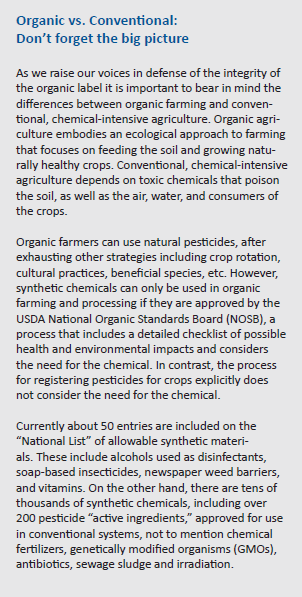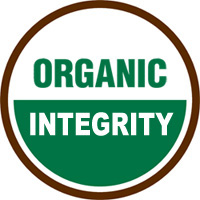Keeping Organic Strong: Changes in organic regulations and farming practice
National Organic Standards Board Spring 2025 Meeting [Virtual]
The Spring National Organic Standards Board meeting will be held from April 29 to May 1, 2025.
See the Spring 2025 issues here
Written comments on the Spring 2025 issues are due by April 28, 2025, and the Public Comment Webinars will be held on April 22 and 24, 2025, from 12 pm to 5 pm EDT.
The National Organic Standards Board (NOSB) virtual meeting is scheduled for April 29 to May 1, 2025. The public meeting of the NOSB is preceded by an opportunity for public comments.
 Beyond Pesticides will provide draft language and urges public participation through this Keeping Organic Strong webpage and through a new "click and submit" Action! This form, Organic Must Lead the Way, will allow for direct submission of public comments to Regulations.gov with suggested comments!
Beyond Pesticides will provide draft language and urges public participation through this Keeping Organic Strong webpage and through a new "click and submit" Action! This form, Organic Must Lead the Way, will allow for direct submission of public comments to Regulations.gov with suggested comments!
Stay tuned for further coverage of the issues before the Board by Beyond Pesticides, and take a deeper dive on the Spring 2025 issues page for in-depth background on priority topics!
Here is the schedule (at this time):
Public Comment Webinars
- Day 1: Tuesday, April 22 from 12 pm - 5 pm EDT
- Day 2: Thursday, April 24 from 12 pm - 5 pm EDT
Public Meeting
- Day 1: Tuesday, April 29 from 12 pm - 5 pm EDT
- Day 2: Wednesday, April 30 from 12 pm - 5 pm EDT
- Day 3: Thursday, May 1 from 12 pm - 5 pm EDT
Additional meeting materials, including the agenda, documents for public inspection, and more, can be found here.
See the Spring 2025 issues here
For information on prior NOSB meeting issues, please see the materials below.
Public Comment
The National Organic Standards Board (NOSB) invites the public to submit written comments and/or provide oral comments on the Spring 2025 meeting issues.
Written Comments:
Written comments can be submitted via Regulations.gov. The deadline to submit written comments is 11:59 pm EDT on Monday, April 28, 2025.
Oral Comments:
The deadline to register for Oral comments is 11:59 pm EDT on Wednesday, April 9, 2025.
Oral comment registration can be done here. The Board will hear oral comments via Zoom.
Webinars:
Tuesday, April 22, and Thursday, April 24, 2025, from 12 - 5 pm EDT.
Links to listen in to the virtual comment webinars and the public meeting are available at this webpage.
Questions? Email Michelle Arsenault, NOSB Advisory Committee Specialist, or call 202-997-0115.
About the Board
The 15-member board, consisting of four farmers, three environmentalists, three consumers, two food processors, one retailer, a scientist, and a certifying agent, votes to allow or prohibit substances and practices in certified organic food and farming. The NOSB acts as a lifeline from the government to the organic community as it considers input from you, the public - the concerned citizens upon whom organic integrity depends. That is why your participation is vital to the development of organic standards. Rest assured, if you submit a public comment in person or online, the Board will consider your concerns. Remember that the NOSB can't take serious action to protect organic integrity without your input!
A Framework to Keep in Mind When Commenting to the NOSB:
According to the Organic Foods Production Act, a synthetic substance may only be allowed for use in organic production if it meets the following criteria [7 USC 6517(c)(1)(B)]:
-
It contains an active synthetic ingredient in the following categories: copper and sulfur compounds; toxins derived from bacteria; pheromones, soaps, horticultural oils, fish emulsions, treated seed, vitamins and minerals; livestock parasiticides and medicines and production aids including netting, tree wraps and seals, insect traps, sticky barriers, row covers, and equipment cleansers.
-
It contains synthetic inert ingredients that are not classified by the Administrator of the Environmental Protection Agency as inerts of toxicological concern.
Additionally, it must be fully established that the use of the substance [7 USC 6517(c)(1)(A)]
- would not be harmful to human health or the environment;
- is necessary to the production or handling of the final product because natural substitutes are not available; and
- is consistent with organic farming and handling (see the NOSB’s Principles of Organic Production and Handling).
Structuring your comments on synthetic substances around these points and referencing the specific stipulations in the law will help the members of the NOSB to understand your argument and will make your input more effective.
View issues that were before the Board at the Fall 2024 meeting
Also, see our NOSB archives pages to read about current and past opportunities for public involvement in the development of organic standards.

The organic regulatory process provides numerous opportunities for the public to weigh in on what is allowable in organic production. USDA maintains a National List, set by the NOSB, of the synthetic substances that may be used and the non-synthetic substances that may not be used in organic production and handling. OFPA and NOP regulations provide for the sunsetting of listed substances every five years and rely on public comment in evaluating their continuing uses. Sunset review, the process of reviewing substances on the National List every five years, is mandated by the Organic Foods Production Act. To be added to the list of allowed synthetics, it must be shown that the use of such substances – (i) would not be harmful to human health or the environment; (ii) is necessary to the production or handling of the agricultural product because of the unavailability of wholly natural substitute products; and, (iii) is consistent with organic farming and handling. The public may also file a petition to amend the National List, either by removing a material currently on the list or adding a new one. In both cases, sunset and petition, the NOSB is authorized by OFPA to determine a substance’s status.
For more information on the history of organic agriculture and why it is the best choice for your health and the environment, please see Beyond Pesticides’ Organic Food Program Page.









